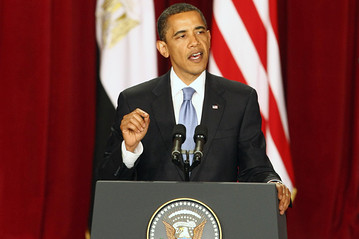www.aljazeerah.info
Opinion Editorials, May, 2016
Archives
Mission & Name
Conflict Terminology
Editorials
Gaza Holocaust
Gulf War
Isdood
Islam
News
News Photos
Opinion Editorials
US Foreign Policy (Dr. El-Najjar's Articles)
www.aljazeerah.info
Jeffery Goldberg's Attempt to Create an Obama Doctrine:
Disappointing and Damaging
By James J Zogby

Al-Jazeerah, CCUN, May 3, 2016
 |
|
| President Obama delivers the Cairo Speech to the Muslim World, 2009 |
From Cairo to Goldberg
Earlier this month "The Atlantic" magazine featured a cover story, "The Obama Doctrine", written by Jeffery Goldberg. Based on the author's many hours of interviews with President Obama, it represents an attempt to find a coherent framework with which to understand the President's overall foreign policy. It was both disappointing and damaging.
It was disappointing in that it presents a portrait of a President who appears to have given up trying to deliver on the promise of his . He has resigned himself to an "unfixable" Middle East and "thrown in the towel", blaming the Arabs for this failure.
At the same time, the article is damaging in that the President is quoted saying things that are deeply insulting to Arabs, causing hurt that will be lasting. The Obama who emerges from the article appears condescending and dismissive. I understand that there is much in the piece that is Goldberg and not Obama, but there are still enough direct quotes, which the President does not deny, that are deeply troubling. One, in particular, stands out for its anti-Arab animus:
"Contrast (the Middle East) with Southeast Asia, which still has huge problems...but is filled with striving, ambitious, energetic people...the contrast is stark. They are not thinking about how to kill Americans. What they're thinking about is 'how do I get a better education? How do I create something of value?"
Not only does the quote ignore the recent bloody history of and current repression practiced by several countries in Southeast Asia, it also slights the dynamic entrepreneurial spirit that is driving economic growth and social change across the Arab World, particularly in the Arab Gulf countries. The comments sounded more like something Donald Trump might have said, not Barack Obama.
Admittedly, this President began his term in office facing a greater set of challenges than any of his immediate predecessors. The country faced the greatest economic crisis since the Great Depression. Not only that, but after two failed wars and the Bush Administration's disastrous handling of Hurricane Katrina, Americans were facing a crisis in confidence. Similarly, American prestige around the world had plummeted to all-time lows, in particular, in the critical region of the Middle East. And to make matters worse, politics in Washington had become increasingly toxic, with Republicans determined to defeat the President's every effort to address the country's economic and foreign policy crises.
Facing down these overwhelming challenges, the new President projected hope and optimism. Working with the Democratic leadership in Congress he moved a series of measures designed to rescue critical industries, stabilize financial institutions, stimulate the economy, expand health care coverage, and create new employment opportunities.
In an effort to address the grave challenges America faced in the Middle East, the President took a number of constructive steps and then traveled to Cairo where he delivered an historic address promising "a new beginning" in the US-Arab relationship. It was a remarkable speech that: admitted shared responsibility, called for mutual understanding, presented a constructive agenda for change, and closed with the President acknowledging that because "no single speech can eradicate years of mistrust" it was imperative that bold action be taken quickly to address the issues that divide our two worlds.
The Arab World responded positively, hoping the new President would deliver. His opponents at home, on the other hand, immediately attacked him, pledging to derail his efforts to change course on Iraq, Guantanamo, Israel/Palestine, and improving ties with Muslim countries—and they did.
Seven years later, the promise of that Cairo speech remains unfulfilled. And expectations have been dashed to the ground. The reasons for the failure are many—some, though not all, of which can be planted at the feet of the weaknesses in the Arab World. There were others. Israeli intransigence blocked any reasonable effort to move toward peace. The Palestinian leadership, so weakened, deformed, and discredited by the US and Israel's mishandling of the so-called "peace process", was unable to play the role they were unfairly asked to assume. The Arab Spring created new uncertainly and instability in the region. The US military, eviscerated by the disastrously long and demoralizing wars in Afghanistan and Iraq, was reeling in exhaustion. And poisonous partisan domestic politics made it difficult for the President to find the support he needed to deliver on promised change.
All of this is lost in Goldberg's "Obama Doctrine". Rewriting history, the Cairo speech is presented as an effort "to persuade Muslims to more closely examine the roots of their unhappiness". Those were Goldberg's words, but they were followed by this Obama quote: "My argument [in Cairo] was this: let's all stop pretending that the cause of the Middle East's problems is Israel". True enough, but if the US couldn't live up to its responsibility in this "new beginning", it is surely unbecoming to place the blame solely at the Arab's doorstep.
The President still has almost nine months to correct and act to deliver on the expectations he created. He can take bold initiatives: support a nuclear free zone in the Middle East; recognize Palestinian sovereignty and statehood; and take steps to rein in Iran and create a regional security framework. I hope he does take steps like these because it would be sad if the epitaph describing the trajectory of his Administration's Middle East policy were to end up being "From Cairo to Goldberg".
***Share this article with your facebook friends
|
|
|
|
||
|
||||||


